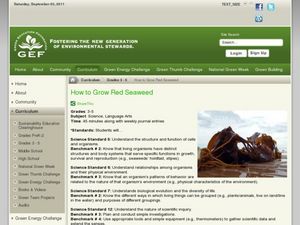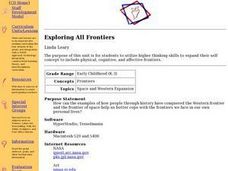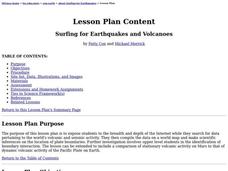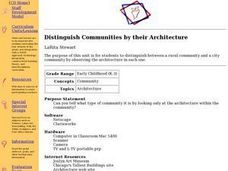School District of Clayton
French Speaking Countries Project
How much do your learners know about Francophone countries? Invite pupils to research different countries and teach one another about the different regions though a brochure and presentation. French language learners can work together or...
EngageNY
End of Unit 2 Assessment: A Hosted Gallery Walk
Speak your mind. Scholars present their claims in groups of three. They use a presentation checklist as each member takes a turn. At the end of the lesson plan, pupils complete an End of Unit 2 Assessment: Presenting a Claim and Findings...
EngageNY
Presenting a Research-Based Claim: Effective Speaking Techniques
Take note. Scholars receive their claim drafts back to revise and write their claims and three pieces of evidence on notecards. They save the notecards to use when the verbally present their claims to the class. At the end, individuals...
EngageNY
Forming a Research-Based Claim: Cascading Consequences Chart
Can you put that in writing? Scholars work with a partner to write a practice claim before writing their own claims. After writing their claims, learners share with class using a Concentric Circles activity.
EngageNY
Summarizing Notes: Planning a Graphic Novelette, Part II: The Invention of Television
Let's work together! Using the collaborative resource, scholars work in triads to begin section two of their storyboards about Philo Farnsworth, the inventor of the television. They then practice using linking words and phrases to...
EngageNY
End of Unit Assessment, Part II: Storyboard Draft, Sections 2 and 3
It's time to demonstrate knowledge. With the instructive resource, pupils complete the second part of the end of unit assessment. They develop sections two and three of their storyboards about an invention, add visual elements, and then...
EngageNY
Author’s Read: Final Performance Task
Scholars submit their final performance task, a letter to a publisher about an athlete's legacy. As a culminating activity, they share their work with classmates in small groups.
EngageNY
Final Performance Task: Delivering an Opinion Speech with Multimedia Display
Welcome to the grand finale! Scholars practice reading their speeches to a partner and make last-minute changes based on feedback. Pupils then present their final opinion speeches to their small groups and show off their work in a...
EngageNY
Editing Sentences and Creating Visual and Multimedia Displays for a Presentation
Let's get visual. Pupils plan visual displays to accompany their upcoming opinion speech presentations. Additionally, they practice editing sentences for clarity before revising their speech drafts.
Curated OER
Food Insecurity
Explore food insecurity and resource scarcity with your class. They discuss the sharing of scarce resources, how to be good caretakers of these resources, and how choices impact the entire world.
Shmoop
ELA - Literacy.CCSS.ELA-Literacy.RST.9-10.6
Key to understanding scientific or technical texts is identifying the underlying question the author is attempting to answer. Provide your young scientists with an opportunity to practice identifying these questions and the procedures...
Channel Islands Film
Lone Woman of San Nicolas Island: Lesson Plan 3
Should researchers be able to excavate, examine, and remove Native American artifacts from historic sites? Should companies be permitted to build on sacred Native American land? After watching West of the West's documentary, The Lone...
Curated OER
Alexander and the Terrible, Horrible, No-Good, Very Bad Day
Second graders interact with the story of Alexander's horrible day by connecting it to their lives. They practice predicting, writing paragraphs, reading aloud, discussing his problems, making a card to cheer him up, and designing a pair...
Curated OER
How To Grow Red Seaweed
Students explore ocean biology by participating in a plant growing activity. In this seaweed lesson, students identify the importance and uses of seaweed in the ocean and examine different seaweed samples. Students utilize an aquarium,...
Curated OER
Morphing
Students examine how organisms adapt to their environment in order to survive. As a class, they discuss the extinction of the dinosaurs and review Darwin's theory of survival of the fittest. They select an animal to morph in the future...
Curated OER
Exploring All Frontiers
Learners utilize higher thinking skills to expand their self concept to include physical, cognitive, and affective frontiers. The teacher create activities which allow students to use raw data and primary sources, as well as...
Curated OER
Gifts from the Hopi
Students examine the gifts a community of long ago can give the community of today in terms of artistic, economic and spiritual areas. Using the Internet, they conduct searches to find information about kachina masks and pottery. They...
Curated OER
People of the Earth
Students explore the rich culture of the southwestern Native Americans through the integration of curriculum. Pupils read and research stories about Native Americans. They write an essay about Native Americans. Additional cross...
Curated OER
The Farm/Prairie
Students explore what people do on the farm/prairie and the importance of the farm/prairie to our lives. Students read books and look at pictures to study about the different aspects of farming. Students create a mural and write a...
Curated OER
The Paleozoic Era
Learners access prior knowledge to create a chart of eras. In this Paleozoic era lesson, students research the Paleozoic era to find information to create dioramas. Learners participate in fossil activities.
Curated OER
Surfing for Earthquakes and Volcanoes
Students search the Internet for data pertaining to the world's volcanic and seismic activity.
Curated OER
Bias vs. Perspective: An Inevitable Aspect of Journalism?
Students explore the types of media that U.S. teens prefer the ways in which viewers identify and account for journalistic bias. They explore the ways in which media shapes one's opinion or affects their judgment.
Curated OER
"Virtual" Model United Nations Day
Students identify and analyze that Global Interdependence and Internationalism have become major themes in human activity in the areas of population, environment, the world economy, and the United Nations.
Students identify the...
Curated OER
Distinguish Communities by Their Architecture
Students distinguish between a rural community and a city community by observing the architecture in each one. They observe and discuss pictures of buildings. Students write a paragraph explaining the purpose of a particular building....
Other popular searches
- Recall Facts and Details
- Recalling Facts and Details
- Facts and Details Memoir
- Restate Facts and Details
- Identify Facts and Details
- Recalling Facts & Details
- Recallpng Facts and Details
- Facts and Details Health
- Supporting Facts and Details

























